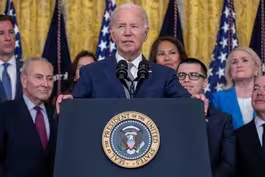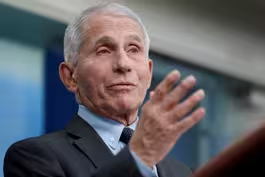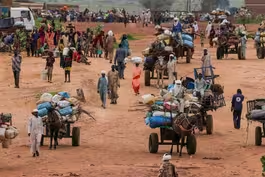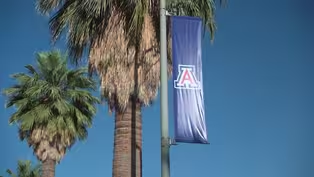
Poll shows most unsatisfied with presidential candidates
Clip: 6/18/2024 | 6m 49sVideo has Closed Captions
Poll shows presidential race in dead heat and most people unsatisfied with candidates
The race for the White House remains in a dead heat with just months to go before Election Day. Lisa Desjardins breaks down the numbers from our latest PBS News/NPR/Marist poll.
Problems playing video? | Closed Captioning Feedback
Problems playing video? | Closed Captioning Feedback
Major corporate funding for the PBS News Hour is provided by BDO, BNSF, Consumer Cellular, American Cruise Lines, and Raymond James. Funding for the PBS NewsHour Weekend is provided by...

Poll shows most unsatisfied with presidential candidates
Clip: 6/18/2024 | 6m 49sVideo has Closed Captions
The race for the White House remains in a dead heat with just months to go before Election Day. Lisa Desjardins breaks down the numbers from our latest PBS News/NPR/Marist poll.
Problems playing video? | Closed Captioning Feedback
How to Watch PBS News Hour
PBS News Hour is available to stream on pbs.org and the free PBS App, available on iPhone, Apple TV, Android TV, Android smartphones, Amazon Fire TV, Amazon Fire Tablet, Roku, Samsung Smart TV, and Vizio.
Providing Support for PBS.org
Learn Moreabout PBS online sponsorshipAMNA NAWAZ: The race for the White House remains in a dead heat with just months to go before Election Day.
Joining me now is Lisa Desjardins and to take a look at our latest PBS News/NPR/Marist polls.
Lisa, as you well know, we are just about a week away from the first presidential debate, about a month for the first political convention.
What did the polls show us right now?
LISA DESJARDINS: First of all, a word about polling.
I know this isn't everyone's favorite topic.
And we at "NewsHour," we're not saying that these numbers are definitive.
You're not meant to be looked at in absolute terms.
They're meant to give context, and we like to give context to them.
So that's what we're going to do tonight.
They do tell us some important things.
First, that top-line number.
Where are we, according to the survey that Marist took in the last week with NPR and "PBS NewsHour"?
-- 49-49, if the election were held today.
Now, the margin of error there is 4.2 percent.
That's important, because I want to add this context.
Let's look at how that number tracks with over the last year or so of this same question.
Look at this.
Really, it has been within the margin of error, essentially a statistical dead heat, for over a year now, which is rather extraordinary.
Obviously, there is a partisan divide here.
There are Republicans more for Trump, Democrats more for Biden.
Independents remain a key question mark.
You see a gender divide among them sometimes, but, otherwise, the electorate is barely moving at all.
AMNA NAWAZ: It's striking to see how those numbers haven't really changed almost a year.
Why are voters so locked in?
LISA DESJARDINS: In a few words, they are unhappy, they are discontented, they are on the way to being miserable.
And you can see that in our poll.
We asked, are you satisfied with the two major-party candidates?
-- 42 percent of those responding said they are satisfied, but 55 percent said they are unsatisfied.
Now, if you take that data, look down a little bit more deeply, you see, in general, that Republicans are a little bit more satisfied than Democrats.
But if you look at independents, 70 percent of them are unsatisfied with both candidates on the ballot.
Now, we're doing a project right now where we are calling voters who have told us that they are unhappy.
We asked for people to respond in our newsletter and in other places.
So, I have been spending the day talking to voters around the country who feel this way.
I spoke to a Republican in Pennsylvania, a former military colonel, who said he's frustrated.
He said he is ticked off, in his words.
I talked to a mother in Wisconsin who said she's frightened.
I talked to a 24-year-old in North Carolina just beginning her political life.
She told me she's jaded.
AMNA NAWAZ: So people are clearly disillusioned with the candidates.
What about on the issues?
Where do people stand on the issues right now?
LISA DESJARDINS: Right.
This is the golden question here.
This is what campaigns want to pay the most attention to.
What is going to work with voters?
What do they care about?
So, here's what we asked.
These were the top three issues that we saw in our poll, preserving democracy, the top issue, 30 percent, inflation, 29 percent, immigration, 19 percent.
So, those top two very close, essentially.
What does this mean?
Again, the layer of context.
Let's look at what the numbers were in February.
Preserving democracy was also number one then with 31 percent.
But I want to call everyone's attention, especially, to that inflation number right there.
Look at that.
That's a big change.
While preserving democracy is where it has been for a while, the concern about inflation actually has jumped up six points.
That is above the margin of error.
So, that indicates there is actually rising concern about inflation right now.
So, we often ask about the economy, about jobs.
But it's not jobs right now.
We know we have a booming job market.
It's inflation.
And we can talk about and we have talked about on air that, in general, in the United States right now, the truth is that inflation has been going down.
The Fed still has some concern, but we are way down from the record inflation that we saw last year and the year before.
But voters in their lives are feeling it still.
They are still concerned about inflation where they live.
AMNA NAWAZ: Interesting to see that concern going up, even as inflation does start to cool a bit over time.
Well, let's talk about how those issues are showing up on the campaign trail specifically.
We know former President Trump was in Wisconsin today at a rally.
Are you seeing these kinds of issues make their way into the message the candidates are delivering on the road?
LISA DESJARDINS: Yes, I love this idea.
Let's look at the debate and the candidates in terms of the knowledge that we have and what voters are saying.
So, the former president, as you said today, was in Racine, Wisconsin.
A reminder that that is one of the key swing states in this election, 10 electoral votes up for grabs there.
And, no surprise, he was talking about the economy there today.
DONALD TRUMP, Former President of the United States (R) and Current U.S. Presidential Candidate: Biden's inflation price hikes and energy destruction have cost the average American family an astonishing $28,000.
Think of that, $28,000.
And on day one of my new administration, we will throw out Bidenomics and replace it with MAGAnomics, MAGAnomics.
(CHEERING AND APPLAUSE) LISA DESJARDINS: MAGAnomics.
It's is all about the nomics, whatever kind of nomics you want.
What's interesting here is that Biden says Bidenomics has actually helped Wisconsin far more.
And if you look at it, this is the exact same area where President Trump, when he was president, promised thousands of jobs through Foxconn development.
That development actually was anemic.
It did not come through.
His pledge was not made.
It was just something like over 1,000 jobs that came through there.
And, in fact, that whole development was sold, now being redeveloped by Microsoft, which Biden says he helped bring.
So, I want to remind folks, this is what President Biden said about this when he was in Wisconsin in May: JOE BIDEN, President of the United States: He came here with your Senator Ron Johnson literally holding a golden shovel promising to build the eighth wonder of the world.
Are you kidding me?
(LAUGHTER) JOE BIDEN: Look what happened.
They dug a hole for those golden shovels, and then they fell into it.
(LAUGHTER) LISA DESJARDINS: So, this is the economy, which, usually, we see as the top issue, and Biden saying, hey, I have been better for this state than former President Trump.
When you look down at the details, Biden says he's bringing about 4,300 jobs, permanent and temporary.
Wisconsin itself, Amna, is setting records for job growth.
Inflation actually is way down there.
It's something like 1.2 -- 2.7 percent in the Midwest.
So, this is a place that is doing better on all economic indicators.
But, even as I talk to voters today from Wisconsin, they are feeling the pinch when it comes to housing, and when they look at their bag of groceries, perhaps they're comparing it to four years ago.
It's better over last year, but they still think it's off-kilter from what they can afford.
AMNA NAWAZ: Lisa Desjardins, with a look at where we are today in this race for the White House.
Lisa, thank you.
LISA DESJARDINS: You're welcome.
Biden plan protects undocumented spouses and Dreamers
Video has Closed Captions
Clip: 6/18/2024 | 7m 29s | How Biden's immigration order shields undocumented spouses and children of citizens (7m 29s)
Congress grills Boeing CEO over company's safety setbacks
Video has Closed Captions
Clip: 6/18/2024 | 7m 36s | Congress probes Boeing CEO over company's safety setbacks and workplace culture (7m 36s)
Fauci discusses new book and life in public health
Video has Closed Captions
Clip: 6/18/2024 | 9m 42s | 'I had that DNA of caring for people': Fauci discusses new book and life in public health (9m 42s)
More than a million threatened in Sudan city under siege
Video has Closed Captions
Clip: 6/18/2024 | 7m 51s | More than a million threatened in Sudan city under siege by paramilitary forces (7m 51s)
Universities profit off land taken from Indigenous people
Video has Closed Captions
Clip: 6/18/2024 | 7m 15s | Investigation reveals how universities profit off land taken from Indigenous people (7m 15s)
Providing Support for PBS.org
Learn Moreabout PBS online sponsorshipSupport for PBS provided by:
Major corporate funding for the PBS News Hour is provided by BDO, BNSF, Consumer Cellular, American Cruise Lines, and Raymond James. Funding for the PBS NewsHour Weekend is provided by...
















